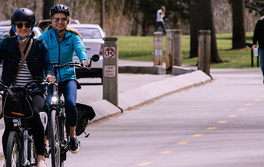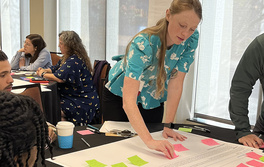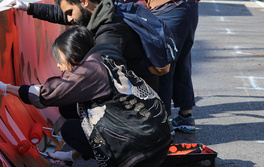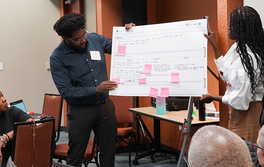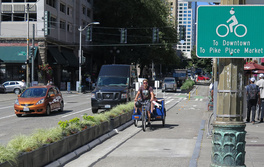
RELEASE: Privacy Principles for Mobility Data Launch
RELEASE: Privacy Principles for Mobility Data Launch
Framework Developed by Mobility Operators, City Agencies, and Privacy Experts Seeks to Better Inform & Guide Data Policies & Practices
(October 28, 2021) — Today, the New Urban Mobility Alliance (NUMO), North American Bikeshare & Scootershare Association (NABSA), and Open Mobility Foundation (OMF) announced the launch of the Privacy Principles for Mobility Data to help guide the mobility ecosystem in the responsible use of data and the protection of individual privacy.

Developed through a collaboration of more than 20 cities, mobility service providers, technology companies, privacy advocates, and academics, the Privacy Principles for Mobility Data are intended to serve as a guiding “North Star” to assess technical and policy decisions that have implications for privacy when handling mobility data. The collaborative, which was convened by NABSA, NUMO, and OMF in 2020, consulted privacy experts, discussed key topics related to data privacy, and identified core ideas and common themes to serve as a basis for these principles.
“Developing the principles was a collaborative process,” said Steve Hoyt-McBeth of the Portland Bureau of Transportation, who served on the Principles’ Drafting Committee. “For more than a year, a diverse group of stakeholders has met regularly to learn, build consensus, and draft the Principles. I’m honored to have worked on this initiative alongside so many dedicated experts in the field.”
The collection and use of mobility data has the potential to benefit society through, for example, enabling shared mobility services and helping public agencies with urban planning and management. In using this data, organizations in the public, private and nonprofit sectors increasingly are faced with decisions that have data privacy implications. The principles were developed to provide guidance that protects individuals and helps organizations effectively communicate and engage with the public when working with mobility data.
“Data is key to building better transportation ecosystems that serve the needs of all communities and allow everyone to access daily needs and economic opportunity,” said Kelsey Finch, Senior Counsel of Future of Privacy Forum. “But that data must be used responsibly, and the privacy of individuals and communities must be protected. The principles are a framework that provides a starting point for dealing with the ethical collection, use, and storage of mobility data.”
The seven Principles are:
- We will uphold the rights of individuals to privacy in their movements.
- We will ensure community engagement and input, especially from those that have been historically marginalized, as we define our purposes, practices, and policies related to mobility data.
- We will communicate our purposes, practices, and policies around mobility data to the people and communities we serve.
- We will collect and retain the minimum amount of mobility data that is necessary to fulfill our purposes.
- We will establish policies and practices that protect mobility data privacy.
- We will protect privacy when sharing mobility data.
- We will clearly and specifically define our purposes for working with mobility data.
Organizations from the public and private sectors are invited to endorse and engage with the principles, which can be used to inform transportation policies and mobility data practices. The principles debuted at the 2021 NABSA Conference, Rolling With It: Empowering Shared Micromobility. After the conference, a recording of the session will be available publicly at nabsa.net/webinars.
To learn more about the principles and how to endorse them, visit: www.mobilitydataprivacyprinciples.org.
The North American Bikeshare & Scootershare Association (NABSA) connects the biggest minds in bikeshare and shared micromobility to support, promote and enhance shared alternatives to traditional transportation across North America. NABSA is the industry’s membership organization with representation from system owners, operators, host cities, equipment manufacturers and technology providers. Learn more at nabsa.net.
NUMO, the New Urban Mobility alliance, is a global organization that channels tech-based disruptions in urban transport to create joyful cities where sustainable and just mobility is the new normal. Founded in 2019 as an outgrowth of the Shared Mobility Principles for Livable Cities, NUMO convenes diverse allies and leverages the momentum of significant evolutions in mobility to target urban issues — including equity, sustainability, affordability, accessibility and labor — impacted by the shifting transportation landscape. NUMO is hosted by WRI Ross Center for Sustainable Cities.
The Open Mobility Foundation is a nonprofit that develops open source tools for cities to manage mobility. Founded in 2019, the Open Mobility Foundation brings together public and private sector stakeholders to understand issues surrounding emerging mobility and create digital tools like the Mobility Data Specification (MDS), which is now used in more than 120 cities around the world. The Open Mobility Foundation is led by cities and has the support of more than 50 members representing a diverse group of public agencies, technology companies, and mobility service providers.
